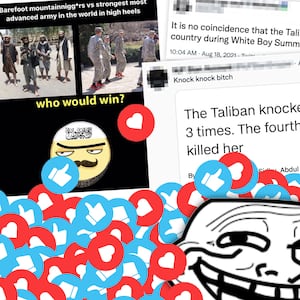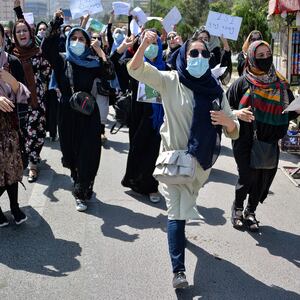He’s the English-tweeting, shitposting Afghan Taliban fanboy who’s found fame marketing the group’s brutal cultural policies to the far right in its favorite language of messageboard memes—and Malang Khostay is enjoying his moment.
Despite the hype of his myriad Western Twitter followers, Khostay isn’t a member of the Taliban or its spokesman (although he says he’s looking for a job in the new government). But after the Taliban took control over Afghanistan, he rose to demi-celebrity status among a Western far-right audience eager to have its cultural politics affirmed by a group that’s been ascendant against the same institutions it despises. And Khostay has been only too happy to give the people what they want in meme after meme.
“Well, I am not an official Taliban right now, I am just their social media supporter” he told The Daily Beast in a Twitter direct message interview. “I am the only one from the Taliban talking to westerners in the meme language which they like most. It’s a little bit funny also.”
ADVERTISEMENT
While not a Taliban official or member, Khostay is close enough for the Westerners eager to be noticed by a group whose homophobia, misogyny, and antisemitism they appreciate.
For better or worse, it’s also established Khostay as a pundit and unofficial Taliban intermediary for more mainstream Westerners ignorant of the group and in search of a convenient, social media-accessible interlocutor who can offer them an explanation of Afghanistan’s new government.
According to Khostay, his 35,000 Twitter followers—which include a devoted audience of far-right troll accounts and 4Chan celebrities—have flooded his inbox with “soo many” direct messages professing an interest, real or ironic, in visiting Afghanistan.
That following also made him a sought after panel host for Twitter’s Clubhouse-like live audio feature, Spaces. In Spaces panels, Khostay now presents himself as an unofficial Taliban explainer-in-chief for the online West. He co-hosts and moderates discussions where panelists put a happy sheen on the future of “fake news and women's issues in Afghanistan” and “protesting and journalism in Afghanistan” for audiences of both his troll followers and blue-check Western pundits and journalists as the militant group in control of the country beats reporters and whips women protesters.
Khostay’s appeal on social media and among the far right stems in part from a mistaken impression of Afghanistan and the Taliban’s supporters as ignorant of, unable to access, or hostile to the internet, much less the peculiar language of its Western subcultures.
“For someone who speaks English and has a brain, it’s not hard to know about Western and American culture,” says Khostay. Hollywood movies, Twitter, and his Playstation 5 helped him learn not just English but Western internet culture. “I play Call of Duty, PUBG, car and motorcycle racing games, GTA and many other games whose names I don’t remember. But right now I’m not free to that.”
Khostay created his Twitter in August and attracted little attention as he shared Pashto-language posts of the Taliban’s rapid progress in seizing power. He found celebrity in the West only when he posted the “Chad Wojak” meme, a variation on the popular “Yes Chad” meme format where a lantern-jawed cartoon character confidently rebuts an opponent’s (“Soyjack”) accusations with a simple “yes.”
In Khostay’s post, a Taliban Chad Wojak displays his pride and agreement in being called "homophobic, anti Semitic,” and “a threat to our liberal democratic society" who "literally treat[s] women like property"
From there, Khostay says he went “viral” and racked up over a thousand retweets. “So after that I started sharing memes.”
The engagement and attention prompted a switch in the tone and direction of his tweeting. What had been a low-follower account sharing footage of Taliban victories for a Pashto-speaking audience in Afghanistan turned into a 35,000-follower account tweeting Taliban policies framed in the language of Western reactionary politics.
Scroll through his feed and you’ll find several variations of the Chad Yes format customized to ridicule Western cultural politics and brush aside criticisms of Taliban rule: there’s the feminists cowering before “Talichad,” transphobic posts about American veterans’ children, and antisemitic Simpsons memes.
White nationalists like Lauren Southern and Laura Loomer have shared his content approvingly (“Taliban memes have me wheezing ngl,” Southern once wrote), fascist and white nationalist Telegram channels are especially fond of them. One of his most shared memes in the extremist right-wing Telegram world showed a Taliban fighter and medieval crusader standing next to each other as they take on a mob of conservative boogeymen—socialists, feminists, and racial minorities—with the pledge to fight them “together.”
The attention has clearly been exciting to Khostay. He’s curious about the possibility of getting a coveted blue check, reserved for authenticating government officials and notable public figures, next to his Twitter account.
“Do you think my account will be verified by Jack?” he asked The Daily Beast, quipping that “I am a Taliban memes minister, is that not enough?”
In a statement released after the Taliban took over Afghanistan, Twitter said it would not ban the Taliban’s official spokesman, Zabihullah Mujahid, suggesting that the company’s approach to the group centered more on an account’s content than its affiliation or proximity to the Taliban.
While Khostay isn’t a member of the group, his account has benefited from Twitter’s light touch approach to moderating content from Taliban supporters.
“Before, I was using Facebook. That’s useless with the banning of accounts. And Twitter’s policy is soft,” Khostay told The Daily Beast via direct messages. He claimed to have had nearly a hundred Facebook accounts and pages suspended by the company for violating community standards (The Daily Beast was unable to verify the assertion).
For as much as the current moment has made him a celebrity, it’s unclear how enduring his fame, the far right’s flirtation with it, and the new Taliban government’s tolerance of it will last. The last time the Taliban enjoyed this much control over the country, internet access was nearly nonexistent and the social media landscape was years away from development. Authoritarian countries, particularly those with strict conservative morality codes, are often uncomfortable allowing the kind of freewheeling online discourse that birthed Khostay’s fanbase to go unregulated.
For now, Khostay tells The Daily Beast he’s heard differing feedback about his account from the Taliban. “Some little social media Taliban says it’s great. Those who don’t know English and memes say stop it.”
As for the future, Khostay says he’s hoping to “join [the Taliban government] soon and will work for my nation,” claims to have a “close relationship with our minister of communication and culture,” and considers Taliban spokesman Zabihullah Mujahid “my teacher.”








